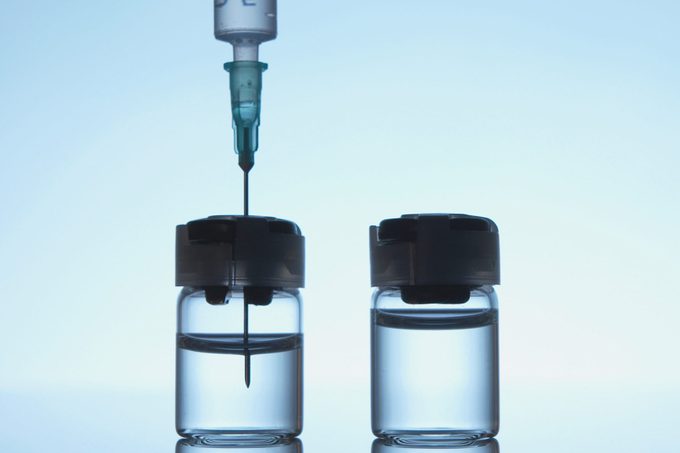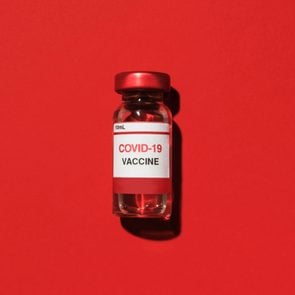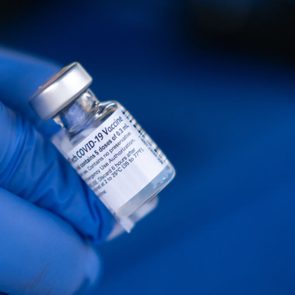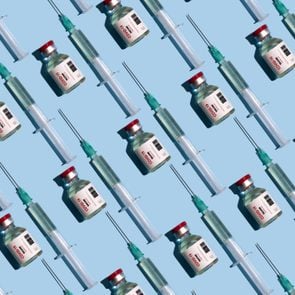Covid-19 Vaccines: Moderna vs. Pfizer—What Docs Need You to Know
Updated: Mar. 30, 2022
Moderna and Pfizer are the first two Covid-19 vaccines available, but how do they compare? Here are the similarities and differences to know.
Moderna vs. Pfizer Covid-19 vaccine: Which is better?
The short answer is neither. In December, the Food and Drug Administration (FDA) released the news the country had been waiting for: The new Covid-19 vaccine, developed by Pfizer and its partner BioNTech, had been approved. A week later, a second vaccine from Moderna was also approved. And now that the vaccine roll-out has begun (albeit slowly), you might be wondering which Covid vaccine is better.
(This is when the Covid-19 vaccine will likely reach you.)
Should you hold off on one vaccine in order to wait for the other? “Absolutely not,” says Reynold Panettieri, MD, a professor at the Rutgers Robert Wood Johnson Medical School and director of the Rutgers Institute for Translational Medicine and Science in New Brunswick, New Jersey. “No difference has been shown.”
Basically, the vaccines are very similar in terms of how they work and how effective they are. So get vaccinated with whatever vaccine is available to you. “The sooner that you are starting to build immunity the better it is for you, for your family, for your community, and for the world,” says Anne Rimoin, PhD, a professor of epidemiology at UCLA Fielding School of Public Health in Los Angeles. “You should take whatever vaccine you can get first.”
Here’s a deeper dive into how the two vaccines, Moderna vs. Pfizer compare. (Also, be sure to avoid these Covid-19 conspiracy theories.)

Which vaccine is more effective?
Both vaccines are extremely effective. In studies published in December 2020 in The New England Journal of Medicine, the Pfizer vaccine was shown to be 95 percent effective in a clinical trial of over 43,000 participants. Moderna’s vaccine was 94 percent effective in a trial of over 30,000. “Both are nearly as effective and no different in adverse effects or duration of protection,” Dr. Panettieri says. “Get the one you can.”
(Find out what it’s like to participate in a Covid-19 vaccine trial.)
How is each administered?
Both are given in a series of two shots. They differ slightly in the spacing in between, with Pfizer’s second dose given 21 days after the first, and Moderna’s 28 days later. In general, you should get the same vaccine for both your first and second dose, according to The New England Journal of Medicine. (Taking one dose of each hasn’t been studied.)
(Read these Covid-19 vaccine stories from people who have already done it.)
What’s unknown about each vaccine?
For both vaccines, there are some things scientists don’t yet have a lot of information on. “In clinical trials, both vaccines seemed to reduce the risk of severe Covid-19 disease,” Dr. Rimoin says. “We still do not know if either prevents asymptomatic infection with the SARS-CoV-2 virus.” That’s why it’s still important to keep wearing face masks and practice social distancing until enough people are vaccinated.
We also don’t know exactly how long the vaccine immunity will last; or if one is better than the other against the mutant strains of Covid-19 we’re starting to see. Pfizer and Moderna have both had initial promising research (not peer-reviewed) on how well the vaccine does against the Covid-19 virus mutations. But more information is needed. Both companies are also working on a “booster” shot to help the response to the mutations as well.
Even with unknowns, don’t put off getting either shot. “The currently available vaccines are comparable, safe, and highly effective,” Dr. Rimoin says.
Does either vaccine have side effects?
Both clinical trials found the most common side effects to be non-serious. They include pain where the shot was given, as well as fever, chills, fatigue, and headache, which indicate your immune system is ramping up. Both vaccines had very rare severe adverse effects. “Pfizer and Moderna vaccines are comparable in safety and side effects,” Dr. Rimoin says.
The Centers for Disease Control and Prevention (CDC) has noted some cases of a severe allergic reaction called anaphylaxis among those who’ve been vaccinated. But these were also very rare for both vaccines: 2.5 cases per million doses for the Moderna vaccine during the period of December 21, 2020 to January 10, 2021. And 11.1 cases per million doses for the Pfizer vaccine during the period of December 14 to December 23, 2020, according to the CDC.
(Here’s why woman may report more Covid-19 vaccine side effects than men.)
Are allergic reactions common?
When you receive either vaccine you will likely be monitored shortly afterward for allergic reactions. In the CDC’s reports, most occurred within 15 minutes of getting the shot. In the rare event you have a reaction, you’ll be advised not to get the second shot. People allergic to any of the ingredients in the Pfizer or Moderna vaccine shouldn’t get the shot, says the CDC (but neither vaccine contains eggs, preservatives, or latex).
If you have had allergic reactions to food or environmental triggers like pet dander, you should still get the shot. However, if you’ve had an allergic reaction to another vaccine, ask your doctor first.
“It is common to see adverse vaccine reactions once wider distribution to the general public begins, even if none of these reactions were observed in clinical trials,” the Asthma and Allergy Foundation of America’s Medical Scientific Council noted in a press statement. “Additional vaccines are in the pipeline so there will likely be more options if it is determined that one vaccine works better in certain populations than others. It’s important to let the science do its work, not the headlines. Anyone with concerns about allergy risk should consult with their doctor.”
(Here are the things allergists won’t tell you.)
How do the vaccines work?
The Moderna and Pfizer vaccines use the same technology, called “messenger RNA” or mRNA. “Both vaccines provide our cells with a building block for generation of the release of viral proteins [the Covid ‘spike’ protein] from our body,” Dr. Panettieri says. “This released protein does not cause infection, but makes the body generate antibodies that fight infection.”
Although the vaccine uses RNA to deliver info about the Covid protein so your cells can recognize the real thing, it doesn’t affect your own genetic material (DNA). Although this is a new technology, mRNA vaccines have been in the works for a while. That’s part of the reason why it was possible to develop them for Covid-19 so quickly.
(Here are other things doctors wish you knew about vaccines.)
Storage, transportation, and shelf life
Moderna’s vaccine requirements make it a little bit easier to store than Pfizer’s. The Moderna vaccine is transported at minus-4 degrees Fahrenheit, around the same temperature as a regular freezer. Pfizer’s has to be shipped and stored at minus 94 degrees Fahrenheit, which requires special freezers most pharmacies and doctors’ offices don’t have.
Moderna also has a better shelf life: It’s good in the fridge for 30 days (or room temperature for 12 hours). Pfizer’s must be used within five days after thawing. One additional boon for Moderna: The minimum order is 100. Pfizer’s is 975, but some communities don’t actually need that much vaccine, so they may opt for Moderna.
But, these differences don’t really affect anybody getting the shot. “For the participant receiving the vaccine, it is of no issue,” Dr. Panettieri says. “Pfizer requires sophisticated storage requirements. But that should have zero concern for the participant receiving the vaccine. It’s a logistics issue for the pharmacies or distributors.”
What ages are the vaccines for?
This is really the only difference when it comes to who should receive one vaccine over the other. “The Pfizer emergency use authorization is for people aged 16 and older,” Dr. Rimoin says. “Moderna’s is for people 18 and older, though the company has recently begun testing its vaccine in 12- to 17-year-olds.”
(Learn how this new Covid-19 disease strikes children.)
What other vaccines are coming, and how do they compare?
“There are hundreds of other Covid-19 vaccines under development—including many with new mechanisms of action—that could prove to be effective, and cheaper and easier to distribute,” Dr. Rimoin says. Johnson & Johnson is submitting its application for Emergency Use Authorization for its vaccine, which the company says is 72 percent effective in the United States (66 percent globally).
“If it shows good safety and efficacy data, this vaccine is going to be a game-changer,” adds Dr. Rimoin. “It is a single dose and does not require extreme cold temperatures for storage like the Pfizer and Moderna vaccines.” Instead, the Johnson & Johnson vaccine can be stored in the fridge for three months, and the fact that it only requires one shot greatly simplifies the process.
How does the Johnson & Johnson vaccine work?
The Johnson & Johnson vaccine works a bit differently than the mRNA vaccines: It uses an adenovirus, a cold virus modified so it can’t make you sick, to transmit info about the Covid “spike” protein to your body, which then recognizes the protein as an invader and fights it. This is similar to the technology being used by the AstraZeneca/Oxford vaccine, which was recently approved in Europe.
Why would I want a vaccine that doesn’t work as well?
Although 72 percent sounds much less effective than the Pfizer and Moderna vaccines, the Johnson & Johnson vaccine is also 85 percent effective globally against severe Covid-19, the most dangerous aspect of the disease. Plus, its ease of use could speed up the process of getting everyone vaccinated.
“If this were out there and we didn’t have the Moderna 94-95 percent [effectiveness] …we would have said, ‘Wow, a 72 percent effective vaccine that’s even more effective against severe disease is really terrific,'” Anthony Fauci, MD, director of the National Institute of Allergy and Infectious Diseases, said in an interview with CNN. “But now we’re always judging it against 94 to 95 percent.”
Optimal care always involves balancing known and potential benefits and risks, says epidemiologist Stanley H. Weiss, MD, a professor of epidemiology at Rutgers School of Public Health in New Brunswick, New Jersey. “Sometimes the enemy of good is ‘better,’ ” he says. “Should someone delay getting effective therapy while awaiting further improvements or access to something else? With SARS-CoV-2, becoming infected carries grave risks.”
(Can Covid-19 harm your brain?)
So the benefit of getting any vaccine outweighs waiting for another?
Once the FDA approves the Johnson & Johnson vaccine for emergency use, “my recommendation is to get the vaccine that is made available to you, especially as there can be no assurance as to when or perhaps even if some other vaccine will become available,” Dr. Weiss says. For example, some places that don’t have the capabilities for the cold storage requirements of the other vaccines might be able to administer Johnson & Johnson’s vaccine, he says.
Plus, getting everyone vaccinated as soon as possible will help defeat the virus quicker. “To get the Covid-19 pandemic into check, we need as many people to get vaccinated with effective vaccines as soon as possible,” Dr. Weiss says. “The more rapidly the virus is spreading, the greater the number of viruses. And then the greater the chance that some new variant will arise. This again points to people not delaying.” (Find out if you need the vaccine if you had Covid-19.)
It’s also possible a second “booster” shot could be added to the Johnson & Johnson vaccine. The company has “a second trial in progress examining efficacy of a two-dose schedule,” Dr. Weiss says. “We will need those results. But I do not recommend waiting for that data before getting an initial dose.”
If you have a complex medical history, you can always talk to your doctor about your concerns over which vaccine to get. In general, though, “you should take an approved vaccine if you have the opportunity,” Dr. Weiss says.
The bottom line
Take whatever vaccine you can get first, as they all protect against getting a severe, potentially deadly case of Covid-19. “Any of these vaccines, including Johnson & Johnson’s, are better than current flu vaccines against the flu,” which are 40 to 60 percent effective, says Dr. Panettieri. “Any Covid-19 vaccine will likely diminish Covid-19 health consequences compared with no vaccine.”
Next, here’s how to prep for a coronavirus winter.



